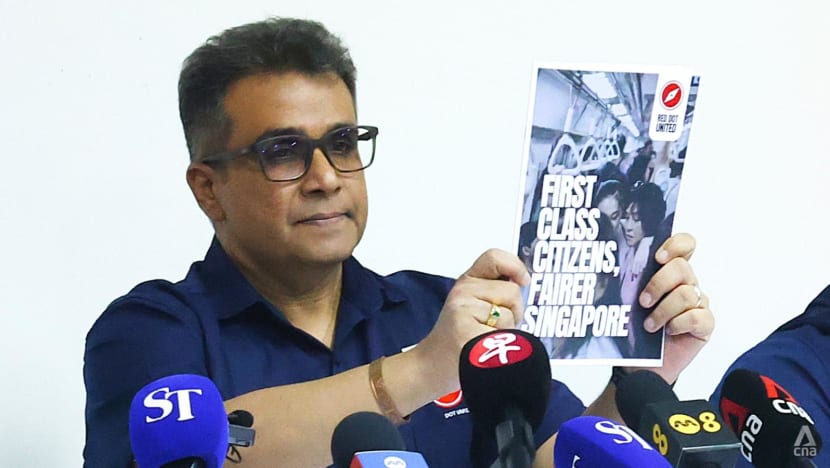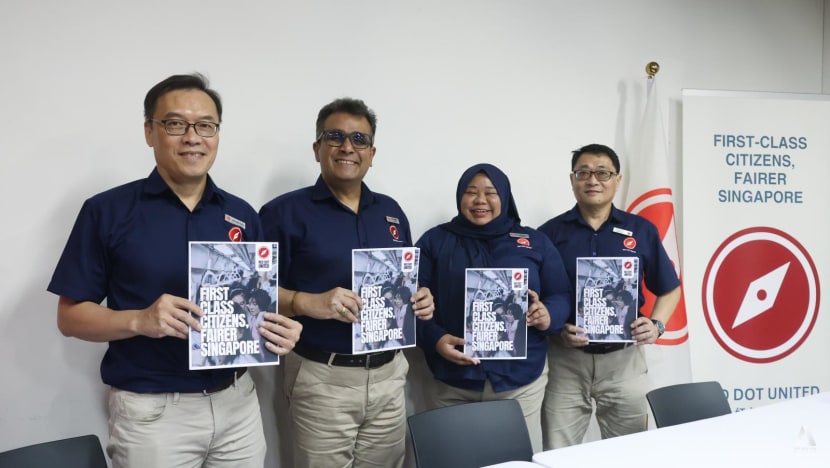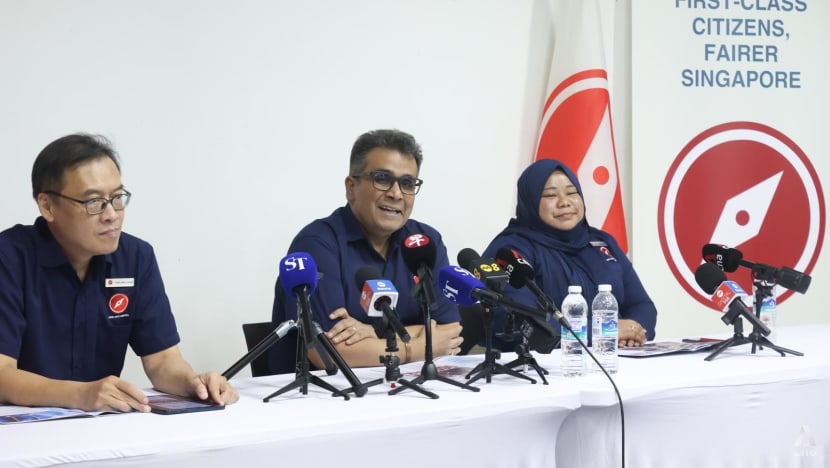GE2025: Red Dot United calls for housing reset and ‘unconditional cash transfer’ for Singaporeans in manifesto
SINGAPORE: Red Dot United (RDU) has unveiled its manifesto for the upcoming General Election, calling for an “unconditional cash transfer” for all Singaporeans and a comprehensive housing reset, among other measures.
In its 24-page document released Saturday (Apr 19), RDU introduced what it called “a new vision for Singapore”. Its policy proposals will be anchored on five “pillars of progress”: Collective Prosperity, Citizens Dividend, Comprehensive Housing Reset, Caring Healthcare, and Civil Freedom.
“These are the new 5Cs – a framework for a Singapore where prosperity is shared, dignity is upheld, and opportunity is a promise for all,” the party’s secretary-general Ravi Philemon told journalists at RDU’s headquarters in Ubi during the manifesto launch.
“We believe that it’s time for a new social contract – one that restores dignity and pride to every Singaporean.”
Mr Philemon added that this social contract would be centred on a “H.E.A.R.T. for Singapore” – namely in the key areas of housing, equitable healthcare, assured prosperity, resilient economy, and transparency.
He also iterated that the policies were not “formed from a vacuum”, but were shaped by feedback gathered from residents when RDU walked the grounds.

The party will campaign under the election slogan: “First-class citizens, fairer Singapore”.
This will be RDU’s second time contesting in the General Election. The party, which was founded in May 2020, had put forward a five-member team in Jurong GRC that same year.
The team obtained 25.39 per cent of the vote against the incumbent People’s Action Party (PAP) slate led by then-Senior Minister Tharman Shanmugaratnam, who left politics in 2023 to contest the presidency.
On Saturday, Mr Philemon confirmed the constituencies that RDU will be contesting in: Holland-Bukit Timah GRC, Jurong East-Bukit Batok GRC, Nee Soon GRC, Jurong Central SMC, and Jalan Kayu SMC.
Some key policy proposals outlined in the party’s election manifesto include:
UNCONDITIONAL CASH TRANSFER FOR SINGAPOREANS
RDU called for the establishment of a “Citizen’s Dividend” – which the manifesto described as an “unconditional cash transfer” that would serve as a financial safety net for all Singaporeans.
The party said the dividend looks to provide financial support to workers in times of job scarcity and underemployment, allowing them to seek better opportunities, reskill and innovate, without the “constant stress of financial survival”.
Mr Philemon said more job losses will be unavoidable, amid a looming trade war between the United States and China.
“From what we have seen so far, Singapore’s attempt to retrain and reskill retrenched and vulnerable workers for economic uncertainty have unfortunately left many falling through the cracks, through no fault of their own,” he added.
“It is clear that the trampoline has too many broken springs, so it is time to bring in a real safety net.”
In 2015, then-Deputy Prime Minister Tharman famously fielded a BBC presenter’s question on Singapore’s notion of a safety net with the answer: “I believe in the notion of a trampoline.”
RDU proposes for the dividend to start with the “most vulnerable employees”, before being progressively expanded to all citizens to “ensure a reliable income floor for everyone”.
Fielding queries from journalists during a question-and-answer segment at the end of the manifesto launch, Mr Philemon was asked to elaborate on the details of the dividend – including its proposed quantum, how often it would be given, and if there were any estimates on how much it would cost.
The secretary general replied he expects the proposed dividend to be in the range of about S$2 billion to S$4 billion, but emphasised the cost will not dip into the national reserves.
“We don’t believe in draining our reserves. That’s not our intention at all,” Mr Philemon said.
“The Singapore government has a track record of having surpluses and a lot of this can be covered from the different taxation that we have. The proposals that we have put forward, they can be made operational if we make changes to our tax policies.”

COMPREHENSIVE HOUSING RESET
The party’s manifesto suggested a “comprehensive housing reset”, including championing for every Housing and Development Board (HDB) estate to be eligible for the Selective En Bloc Redevelopment Scheme (SERS).
RDU believes this would ensure that older flats retain value and are renewed instead of “being left to decay”.
Other housing-related policy changes it is advocating for includes expanding public rental housing and introducing a rent-to-own scheme. The party added that such a proposal would cater to the bottom 20 per cent of income-earners struggling with homeownership and young, single Singaporeans by providing them with a “structured pathway” to owning a home.
The manifesto also recommended restricting permanent residents and new citizens of less than 10 years – except those who have completed National Service – from purchasing resale flats with less than 79 years of lease remaining.
SHIFTING TO A “WELLBEING ECONOMY”
Proposing to tackle rising cost of living issues “from the root”, RDU said that this would include prioritising fair wages and providing job security with a “citizens-first” hiring policy.
“We want every citizen to have a decent wage and to be paid what they deserve,” Mr Philemon said.
“The painful truth that most Singaporeans face is that wage increase has barely kept up with inflation last year. While Singapore continues to attract investment from the global billionaire club, we do not see this trickling down to everyday workers.”
Noting that small-medium enterprises (SMEs) are among the largest employers in Singapore, RDU also called upon the government to support these businesses by ensuring fairer procurement policies, tackling late payments, moderating rents, and making grants more accessible.
It added that this would allow local businesses to thrive in an economy that has “increasingly prioritised” large corporations and foreign investments.

HEALTHCARE, SUSTAINABILITY, CIVIL FREEDOM
Beyond the key recommendations, the party also called for healthcare- and sustainability-related policy changes.
The manifesto argued that the current carbon tax system places an “undue burden” on consumers while failing to effectively curb emissions, suggesting it be replaced with “enforceable emission limits on high-impact corporations” to drive accountability.
RDU also put forward suggestions to “redesign” MediSave to function as a supplementary fund rather than the primary means of financing medical costs.
The manifesto said current laws such as the Protection from Online Falsehoods and Manipulation Act (POFMA) and Protection from Harassment Act (POHA) have been used to “stifle dissent and silence independent voices”. It added: “Singapore cannot thrive as a knowledge-based economy if it restricts critical thinking, innovation, and public discourse.”
The party recommended the passing of a “Freedom of Information Act” to “empower citizens” with access to information.
At the press conference on Saturday, Mr Philemon clarified about the proposed act that guidelines and parameters can be drawn for confidential information surrounding Singapore’s security matters.
Nevertheless, he suggested possibly putting a “time stamp”, or a time period that is allowed to lapse, before such information is released to the public.
Disclaimer: Investing carries risk. This is not financial advice. The above content should not be regarded as an offer, recommendation, or solicitation on acquiring or disposing of any financial products, any associated discussions, comments, or posts by author or other users should not be considered as such either. It is solely for general information purpose only, which does not consider your own investment objectives, financial situations or needs. TTM assumes no responsibility or warranty for the accuracy and completeness of the information, investors should do their own research and may seek professional advice before investing.
Most Discussed
- 1
- 2
- 3
- 4
- 5
- 6
- 7
- 8
- 9
- 10